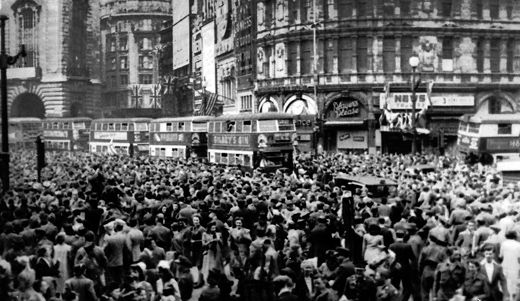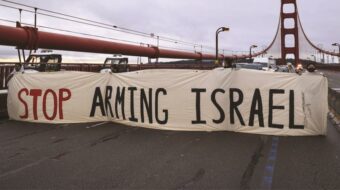
V-E Day, or Victory in Europe Day, is celebrated on May 8 by the U.S., but actually the formalities of the war’s end were spread over three days. Adolf Hitler had committed suicide on April 30th, during the final Battle of Berlin, leaving authority to surrender in the hands of his successor, Reichspräsident Karl Dönitz.
On May 7, 1945, Soviet, American, British and French ranking officers crowded into a second-floor recreation room of the red brick schoolhouse which served as Supreme Allied Commander Gen. Dwight D. Eisenhower’s headquarters, at Reims, France, about 90 miles northeast of Paris. Representing Germany, Field Marshal Alfred Jodl signed an unconditional “instrument of surrender” of all German fighting forces. Eisenhower asked Jodl if he fully understood what he had signed, including the requirement that German commanders sign a formal surrender to the USSR at a time and place determined by that government.
On the following day, May 8, a second surrender, to the Soviets, was held in a former German Army Engineering School in the Berlin district of Karlshorst, which now houses the German-Russian Museum Berlin-Karlshorst. The solemn ceremony befitted the loss of over 20 million Soviet lives during the war. It was signed by supreme German military commander Wilhelm Keitel, certain Allied representatives, and Gen. Georgy Zhukov of the Red Army, who played the most pivotal role in leading the Soviet drive through much of Eastern Europe to liberate those nations from the Axis occupation. In accordance with the surrender of the previous day at Reims, the end of hostilities was set for one minute past midnight on May 9.
But the news did not get out in a uniform manner. Battle between German and Soviet forces continued through the next day. On May 9, the Soviets lost another 600 soldiers in Silesia. For this reason V-E Day is celebrated on May 9th in Russia. On that day, Joseph Stalin saluted his nation in a radio broadcast, saying, “The age-long struggle of the Slav nations… has ended in victory. Your courage has defeated the Nazis. The war is over.”
The victory happened on President Harry Truman’s 61st birthday. He dedicated the victory to the memory of his predecessor, Franklin D. Roosevelt, who had died of a cerebral hemorrhage less than a month earlier, on April 12th.
Ecstatic crowds all over the world massed to celebrate V-E Day. The war in the Pacific continued.
In the years immediately following the end of World War II, the Great Powers claimed their “spheres of influence” in Europe, largely dividing the continent between east and west.
The United States and other Western nations are refusing to join the Russians in commemorations of this historic 70th anniversary of the end of World War II, citing disapproval of current Russian policy. On this occasion – surely the last when any massed numbers of active participants in the war will be able to assemble – once again, regrettably, opportunities to seek common ground are sacrificed to immediate political expediency.
Adapted from Chase‘s Calendar of Events and other sources.
Photo: Crowds gather in celebration in London during V-E Day in 1945. | Wikipedia (CC)












Comments